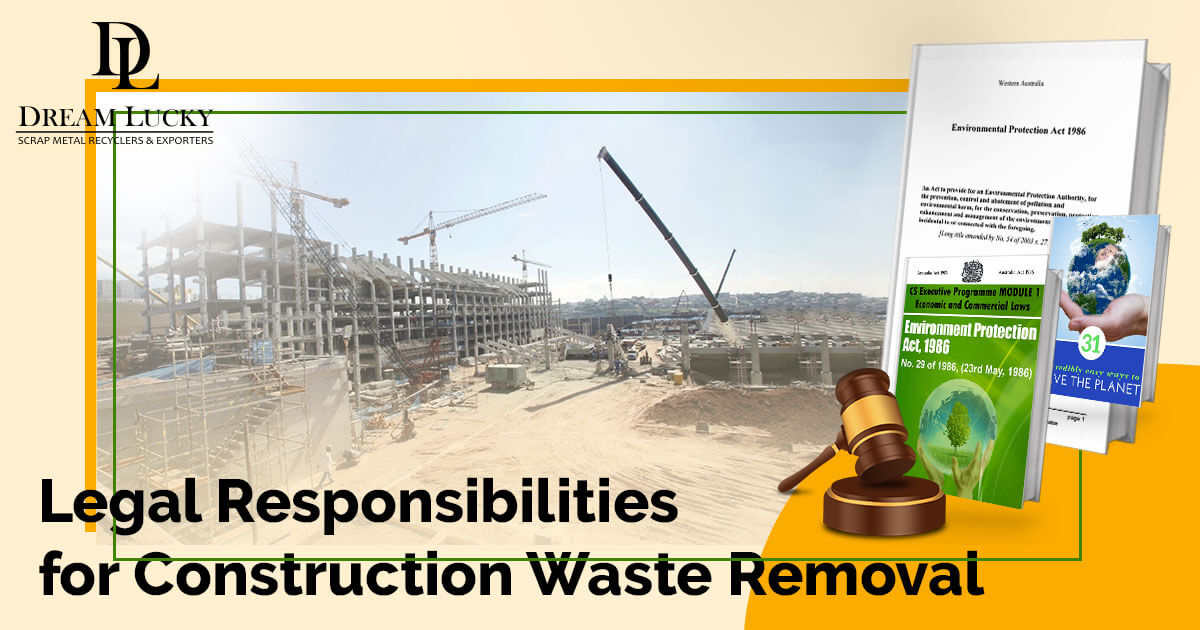
In Western Australia (WA), construction companies have specific legal responsibilities when it comes to managing waste from their projects. These regulations aren’t just about compliance; they’re about protecting our environment and communities from the impacts of construction waste.
Here’s a breakdown of the key laws and what construction companies must do to handle waste responsibly and in line with WA’s environmental standards.
Key Laws and Regulations
1. Environmental Protection Act 1986
This is WA’s main law for protecting the environment, setting out the framework for waste management. The act covers a broad range of environmental matters and requires companies to manage waste properly to avoid polluting the land, water, or air.
Non-compliance with this act can lead to fines or other penalties, so companies need to know their obligations under this law.
2. Environmental Protection (Controlled Waste) Regulations 2004
These regulations apply specifically to “controlled waste,” which includes any materials that might harm people or the environment if they’re not handled carefully. Under these regulations, anyone transporting controlled waste must have a licence, and the same goes for the vehicles and drivers involved.
Construction companies are responsible for making sure that only licensed carriers handle and dispose of their waste, ensuring safety and accountability throughout the disposal process.
3. Waste Avoidance and Resource Recovery Strategy 2030
WA’s long-term strategy for waste management, this policy is focused on reducing waste and increasing recycling. Although it’s not a law, this strategy is a guide that construction companies can follow to make their waste practices more sustainable.
By aligning with this strategy, companies can reduce their waste footprint and contribute to WA’s sustainability goals.
Responsibilities of Construction Companies
1. Duty of Care
WA’s Environmental Protection Act requires construction companies to take “duty of care” seriously when handling waste. This means companies need to actively manage their waste to avoid any harm to the environment.
Most companies hire licensed waste removal contractors to ensure they’re following best practices for waste disposal. This “duty of care” also includes tracking where waste goes and ensuring it’s disposed of at an authorised facility.
2. Site Waste Management Plans (SWMP)
While Site Waste Management Plans (SWMPs) aren’t required by law, they’re highly recommended as best practice. An SWMP helps companies plan for waste management, identifying ways to reduce, reuse, and recycle materials before disposal.
SWMPs can improve compliance, reduce waste disposal costs, and support environmental sustainability by helping companies manage waste more efficiently and reduce their reliance on landfills.
3. Waste Segregation and Disposal
Properly sorting and segregating waste is essential for construction companies. WA regulations encourage companies to separate different types of waste on-site, making it easier to recycle materials where possible.
Hazardous waste, in particular, needs to be separated from general waste to prevent contamination. Segregation also supports recycling goals, helping companies reduce their environmental footprint and align with WA’s Waste Strategy 2030.
Compliance and Enforcement
WA’s Department of Water and Environmental Regulation (DWER) is responsible for making sure construction companies comply with these waste management rules. DWER has the authority to conduct inspections and audits of construction sites to ensure companies are handling waste correctly.
They also have the power to issue penalties, including fines, if companies fail to meet their legal obligations. Ensuring compliance means companies need to keep records of their waste disposal activities and use only licensed waste transporters.
Why Compliance Matters
Following these legal requirements is about more than just avoiding fines; it’s about creating a safer and cleaner environment for everyone. By properly managing waste, construction companies help prevent pollution, protect local communities, and conserve resources.
This is becoming even more important as WA works towards its long-term sustainability goals through the Waste Avoidance and Resource Recovery Strategy 2030. Companies that adopt these practices not only protect themselves from legal action but also show their commitment to environmental responsibility.
This can boost their reputation with clients and the community, demonstrating a proactive approach to sustainable building and waste management.
Steps for Responsible Waste Management
- Hire Licensed Waste Carriers: Use licensed contractors to transport controlled waste to avoid compliance issues.
- Create a Site Waste Management Plan (SWMP): Even though it’s not required, having an SWMP makes it easier to manage waste efficiently and sustainably.
- Segregate Waste: Separate hazardous and non-hazardous waste to support recycling and comply with WA’s waste guidelines.
- Maintain Records: Keep documentation of waste disposal activities to demonstrate compliance if inspected by DWER.
From 2019 to 2024, WA’s waste management regulations have emphasised the importance of handling construction waste responsibly. Adhering to the Environmental Protection Act 1986, Controlled Waste Regulations 2004, and WA’s Waste Strategy 2030 can help construction companies manage their waste effectively and contribute to a more sustainable future.
By following these guidelines, companies protect themselves legally and support WA’s broader environmental goals. For efficient construction rubbish removal with Dream Lucky Scrap Metal, businesses can ensure compliance while contributing to a cleaner, greener state.
Implementing best practices and working with licensed waste professionals is the way forward for responsible, sustainable construction in WA, so contact us for a free consultation to get started.
Omer Bekhit
The dedicated owner and operator of Dream Lucky Scrap Metal. He has been at the forefront of ethical scrap metal recycling, exporting, and dealing. With a hands-on approach to the business, Omer ensures that every transaction is conducted with transparency and sustainability in mind.